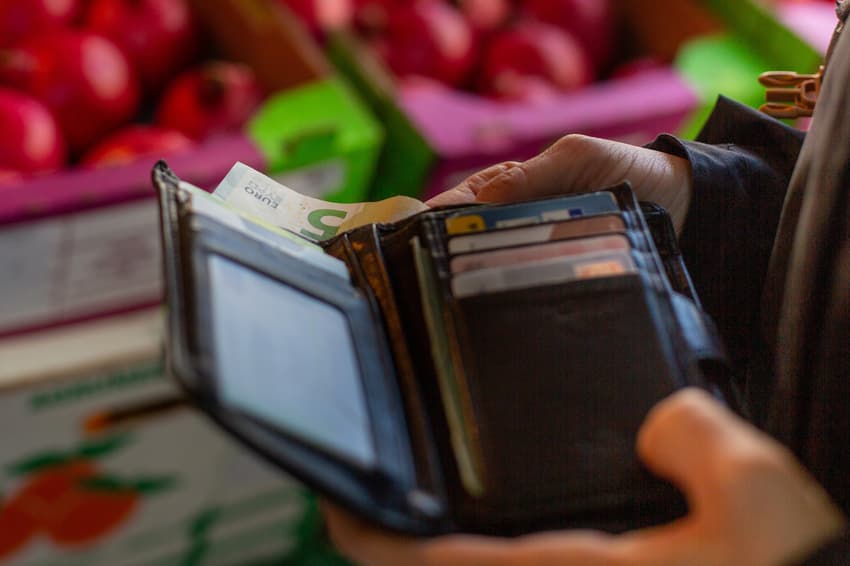Energy crisis: Which everyday German products are increasing the most in price?

Inflation in Germany reached 10.4 percent in October – the highest level in 70 years. The Federal Statistical Office has now announced which prices have risen particularly sharply.
Energy prices
Energy prices in Germany have risen significantly as a result of the Russian invasion of Ukraine and the squeeze on cheap energy supplies and high energy prices are the biggest driver of inflation.
Despite the relief measures taken by the federal government over the past year, energy prices in October were 43 percent higher than in the same month last year.
READ ALSO: KEY POINTS: Germany’s inflation relief measures to support people in cost of living crisis
According to the German Federal Statistical Office, household energy in particular has become significantly more expensive.
Prices for natural gas, for example, have more than doubled since last October – increasing by 109.8 percent.
The cost of heating with other energy sources has also risen sharply - the price of firewood, wood pellets or other solid fuels has increased by 108.1 percent since October 2021, while the price of heating oil has increased by 83 percent. Electricity prices have also increased by 26 percent.

A man fills up his car at a gas station in Duisburg. Photo: picture alliance/dpa | Christoph Reichwein
Prices for gasoline and diesel have also risen by more than 22 percent since last year. In October, an average 40-litre tank of Super E10 cost €76 - €10 more than a year ago and €26 more than in 2020.
Groceries
According to the Federal Statistical Office’s report, private households are now paying on average 20.3 percent more for groceries than in October 2021.
The biggest price hike has been for edible fats and oils - such as butter and cooking oil - which have increased by 49.7 percent since last October.

A girl spreads butter on a slice of bread. Photo: picture alliance/dpa | Patrick Pleul
Dairy products and eggs are 28.9 percent more expensive than a year ago, while vegetables and cereal products are 23.1 and 19.8 percent more expensive respectively.
The statisticians attribute the price increases to supply bottlenecks and problems in the upstream stages of the production chain as the main reasons for these cost hikes.
READ ALSO: Fact check: Is Germany heading into a recession next year?
Prices for meat have also risen by 19.3 percent within the last year, as the cost of energy, fertilizer and feed has risen sharply, while labour shortages and minimum wage increases have made personnel costs more expensive.
Vocabulary
Price increases - (die) Preiserhöhungen
Wood pellets - (die) Holzpellets
Heating oil - (das) Heizöl
Dairy products - (die) Molkereiprodukte
Cereal products - (die) Getreideprodukte
We’re aiming to help our readers improve their German by translating vocabulary from some of our news stories. Did you find this article useful? Let us know.
Comments
See Also
Energy prices
Energy prices in Germany have risen significantly as a result of the Russian invasion of Ukraine and the squeeze on cheap energy supplies and high energy prices are the biggest driver of inflation.
Despite the relief measures taken by the federal government over the past year, energy prices in October were 43 percent higher than in the same month last year.
READ ALSO: KEY POINTS: Germany’s inflation relief measures to support people in cost of living crisis
According to the German Federal Statistical Office, household energy in particular has become significantly more expensive.
Prices for natural gas, for example, have more than doubled since last October – increasing by 109.8 percent.
The cost of heating with other energy sources has also risen sharply - the price of firewood, wood pellets or other solid fuels has increased by 108.1 percent since October 2021, while the price of heating oil has increased by 83 percent. Electricity prices have also increased by 26 percent.

Prices for gasoline and diesel have also risen by more than 22 percent since last year. In October, an average 40-litre tank of Super E10 cost €76 - €10 more than a year ago and €26 more than in 2020.
Groceries
According to the Federal Statistical Office’s report, private households are now paying on average 20.3 percent more for groceries than in October 2021.
The biggest price hike has been for edible fats and oils - such as butter and cooking oil - which have increased by 49.7 percent since last October.

Dairy products and eggs are 28.9 percent more expensive than a year ago, while vegetables and cereal products are 23.1 and 19.8 percent more expensive respectively.
The statisticians attribute the price increases to supply bottlenecks and problems in the upstream stages of the production chain as the main reasons for these cost hikes.
READ ALSO: Fact check: Is Germany heading into a recession next year?
Prices for meat have also risen by 19.3 percent within the last year, as the cost of energy, fertilizer and feed has risen sharply, while labour shortages and minimum wage increases have made personnel costs more expensive.
Vocabulary
Price increases - (die) Preiserhöhungen
Wood pellets - (die) Holzpellets
Heating oil - (das) Heizöl
Dairy products - (die) Molkereiprodukte
Cereal products - (die) Getreideprodukte
We’re aiming to help our readers improve their German by translating vocabulary from some of our news stories. Did you find this article useful? Let us know.
Join the conversation in our comments section below. Share your own views and experience and if you have a question or suggestion for our journalists then email us at [email protected].
Please keep comments civil, constructive and on topic – and make sure to read our terms of use before getting involved.
Please log in here to leave a comment.